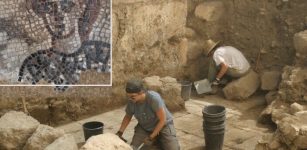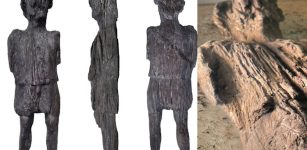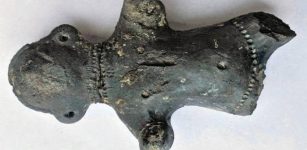Posca: ‘Wine Of The People’ Was Popular In Ancient Rome And Greece
A. Sutherland - AncientPages.com - While pulque (“Drink of the Gods”) is Mexico’s oldest alcoholic beverage of the Maya, Aztecs, Huastec and other cultures in ancient Mesoamerica, posca was the ‘wine of the people’ in ancient Rome and Greece around the second century BC.
At first, posca (the Latin Potor (to drink) or from the Greek epoxos (very sharp), was a medical mixture prepared from sour wine or vinegar with water. Recent studies have shown that posca was actually quite healthy. It had health benefits because it contained vitamin C and its strong acidity easily killed all harmful bacteria. Added flavoring herbs and spices (especially coriander seeds), made posca taste much better.
In ancient Rome, drinking undiluted wine was considered barbaric. Wine concentrate (must) diluted
with water was drunk and posca - the ancient equivalent to cheap 3-2 beer of today - was a particularly common drink among the poorer classes of the society due to its low price and low alcohol content.
Soon the drink also gained popularity among the Roman soldiers and the slaves of ancient Rome.
The widespread use of posca, throughout the Roman period from the 300-200 BC and at the beginning of the Byzantine period, is attested by numerous references in ancient sources such as the natural histories of Pliny the Elder to the comedies of Plautus (second century BC). In the Byzantine army the drink was actually called the phouska.
See also:
Pulque: Ancient Drink Of The Gods Is Popular Again But It Has Odd Side-Effects
Scipio Africanus – Rome’s Greatest General Who Defeated Unbeatable Hannibal
Mead: Secret Drink Of The Vikings And Gods – Was It An Ancient Antibiotic?
Some of the higher ranks of the Romans drinking posca was Scipio Africanus, general and the greatest of the famous Roman family of the Scipios, aristocrats and militaries that commanded armies in the Empire, and Metellus, a prominent politician, who in this way wanted to express their solidarity with army soldiers.
As recorded by biographer, essayist, philosopher, Plutarch (46 AD - 120 AD), yet another posca drinker was a Roman senator and historian, Cato the Elder (234–149 BC) and according to the Roman collection of biographies known as “Historia Augusta”, Hadrian (Roman emperor from 117 to 138) who "actually led a soldier’s life”, was also one of the posca drinkers when in military campaigns.
The same source records that by Hadrian’s time, sour wine was a standard part of the normal "camp fare" (cibus castrensis). Officially, a decree dated to 360 AD instructed that lower ranks of the Roman army should drink posca and wine on alternate days.
No exact recipe for the drink survived until today. However, the drink can be recreated according to this recipe:
Posca recipe
1.5 cups of red wine vinegar.
0.5 cups of honey.
1 tablespoon of crushed coriander seed.
4 cups of water.
Boil it so that the honey dissolves.
Let it cool down so that it reaches room temperature.
Filter the coriander seeds.
Written by – A. Sutherland - AncientPages.com Senior Staff Writer
Copyright © AncientPages.com All rights reserved. This material may not be published, broadcast, rewritten or redistributed in whole or part without the express written permission of AncientPages.com
Expand for referencesMore From Ancient Pages
-
 Depictions Of Two Biblical Heroines Unearthed In Ancient Synagogue, Huqoq In Galilee, Israel
Archaeology | Aug 24, 2022
Depictions Of Two Biblical Heroines Unearthed In Ancient Synagogue, Huqoq In Galilee, Israel
Archaeology | Aug 24, 2022 -
 Rollo: Viking Sea Lord, Chieftain, Lone Wolf And The First Ruler Of Normandy
Featured Stories | Dec 6, 2023
Rollo: Viking Sea Lord, Chieftain, Lone Wolf And The First Ruler Of Normandy
Featured Stories | Dec 6, 2023 -
 Pre-Inca Societies In The Andes Lacked Hierarchical Leadership And Shared Power Before The Incas Arrived
Archaeology | Dec 13, 2017
Pre-Inca Societies In The Andes Lacked Hierarchical Leadership And Shared Power Before The Incas Arrived
Archaeology | Dec 13, 2017 -
 Rare ‘Polishing Boulder’ Used By Stone Age People Found In Dorset, UK
Archaeology | Aug 26, 2023
Rare ‘Polishing Boulder’ Used By Stone Age People Found In Dorset, UK
Archaeology | Aug 26, 2023 -
 Unique Ancient Three-Headed Eagle Pendant Discovered In Finland: A Symbol Of Three Different Human Souls
Ancient Symbols | May 6, 2016
Unique Ancient Three-Headed Eagle Pendant Discovered In Finland: A Symbol Of Three Different Human Souls
Ancient Symbols | May 6, 2016 -
 Unusual Iron Age Burial With Warrior And Sword Discovered On Gotland, Sweden – Was He From The Roman Empire?
Archaeology | Sep 7, 2021
Unusual Iron Age Burial With Warrior And Sword Discovered On Gotland, Sweden – Was He From The Roman Empire?
Archaeology | Sep 7, 2021 -
 Reconstructing The Lost Ancient World Of The Marquesas Islands With Unique Plants And Animals
News | Mar 31, 2022
Reconstructing The Lost Ancient World Of The Marquesas Islands With Unique Plants And Animals
News | Mar 31, 2022 -
 On This Day In History: Henry VIII Ascended The Throne Of England – On Apr 22, 1509
News | Apr 22, 2016
On This Day In History: Henry VIII Ascended The Throne Of England – On Apr 22, 1509
News | Apr 22, 2016 -
 Unexpected Discovery Of Rare Ancient Roman Carved Wooden Figure In Buckinghamshire
Archaeology | Jun 11, 2022
Unexpected Discovery Of Rare Ancient Roman Carved Wooden Figure In Buckinghamshire
Archaeology | Jun 11, 2022 -
 Jamukha: Mongolian Leader, Military And Childhood Friend Of Genghis Khan But Not Forever
Featured Stories | May 8, 2019
Jamukha: Mongolian Leader, Military And Childhood Friend Of Genghis Khan But Not Forever
Featured Stories | May 8, 2019 -
 Stunning Reconstructions Shows What Colchester Looked Like During Roman Times
News | Jul 2, 2022
Stunning Reconstructions Shows What Colchester Looked Like During Roman Times
News | Jul 2, 2022 -
 Mysterious Undeciphered Carvings And Script On Stela Of Montoro
Archaeology | Aug 14, 2017
Mysterious Undeciphered Carvings And Script On Stela Of Montoro
Archaeology | Aug 14, 2017 -
 Countess Loretta Of Sponheim Kidnapped Archbishop Of Trier And Got Away With It
Featured Stories | Sep 26, 2018
Countess Loretta Of Sponheim Kidnapped Archbishop Of Trier And Got Away With It
Featured Stories | Sep 26, 2018 -
 First Genomic Evidence Of Early Migration From New Guinea Into The Wallacea Archipelago – New Study
Archaeology | Jan 14, 2025
First Genomic Evidence Of Early Migration From New Guinea Into The Wallacea Archipelago – New Study
Archaeology | Jan 14, 2025 -
 On This Day In History: Statue Of Venus de Milo Is Discovered On The Aegean Island Of Milos – On Apr 8, 1820
News | Apr 8, 2016
On This Day In History: Statue Of Venus de Milo Is Discovered On The Aegean Island Of Milos – On Apr 8, 1820
News | Apr 8, 2016 -
 Troublesome Momus: Deity Of Irony, Ridicule, Sarcasm And Harmful Jokes In Greek And Roman Mythology
Featured Stories | Mar 14, 2022
Troublesome Momus: Deity Of Irony, Ridicule, Sarcasm And Harmful Jokes In Greek And Roman Mythology
Featured Stories | Mar 14, 2022 -
 Lothal – ‘City of Dead’ – One Of The Most Prominent Ancient Places In Danger To Be Forgotten
Featured Stories | Jun 10, 2015
Lothal – ‘City of Dead’ – One Of The Most Prominent Ancient Places In Danger To Be Forgotten
Featured Stories | Jun 10, 2015 -
 Evidence Of Sangam Age Settlement Unearthed At Nangur, Tamil Nadu
Archaeology | Jul 11, 2019
Evidence Of Sangam Age Settlement Unearthed At Nangur, Tamil Nadu
Archaeology | Jul 11, 2019 -
 Evidence Of Extensive Human Fire Use 50,000 Years Ago
Archaeology | Jul 9, 2025
Evidence Of Extensive Human Fire Use 50,000 Years Ago
Archaeology | Jul 9, 2025 -
 Ancient Atlantean Sculpture Discovered At The Mayan Chichen Itza Archaeological Site
Archaeology | Aug 29, 2023
Ancient Atlantean Sculpture Discovered At The Mayan Chichen Itza Archaeological Site
Archaeology | Aug 29, 2023

